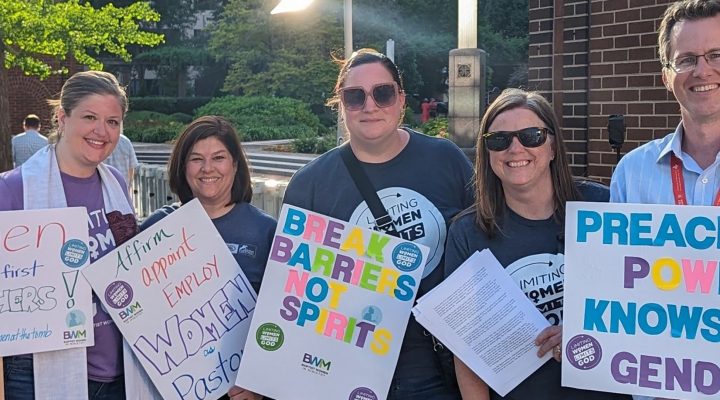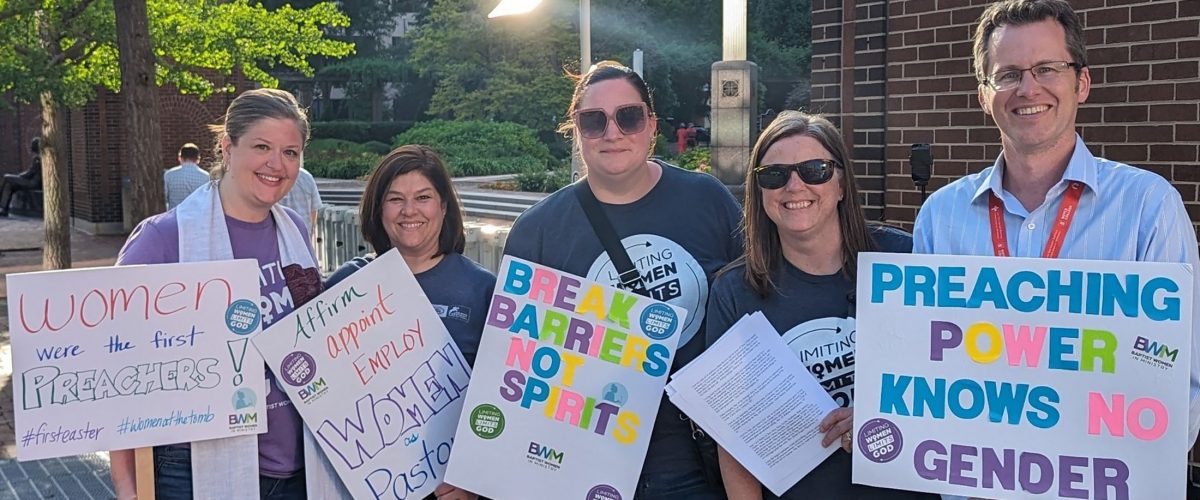As an ordained Baptist minister, I always knew I was unwelcome at the Southern Baptist Convention. But after my experience at their annual meeting this month, my body will always carry with it the sting of knowing I am not only unwelcome to them, I am unacceptable.
Baptist Women in Ministry attended the convention to represent its community, stand in solidarity with all women in ministry and share the message of women’s equal value to God in a space that was actively diminishing women’s value. We did this by holding signs with slogans of support for women in ministry and by praying the prayers of our community that had been submitted ahead of the event.

Nikki Hardeman
Walking around the resource fair the day before our public demonstration of support for women in ministry, I paid attention to how my body felt. At every turn, I was aware that most people would object to me being a minister. If given the opportunity, they would say my call was not real. It was unsettling and disorienting.
I have been privileged to be in so many places that have affirmed me as a minister. Walking around that hall, I found myself feeling increasingly angry for women who have had to and still do endure places in which the validity of their call is constantly questioned. It is a demoralizing feeling.
We set up early on Tuesday morning outside the entrance to the convention hall, starting Facebook Live to share the prayers, and held up our signs as messengers to the SBC were streaming toward the convention hall. More than 10,000 were present in Indianapolis for the event.
The reactions from those passing by were mixed. Some gave us timid thumbs up like a secret code of support, while others were confident enough to pump a fist in the air in solidarity with female ministers. Some sneered at us and others shouted remarks drive-by style like, “You’re wrong!” after walking a few feet past us. Some women came up to us when there was no crowd around to say thank you for what we were doing. My favorite thing to see was children squinting their eyes at our signs to read what they said. One little girl asked, “Daddy, what does ‘affirm’ mean?”
I was holding a sign with the slogan “Preaching power knows no gender.” One man approached me and started to put his hand on my arm. After telling him not to touch me, he leaned in toward me and said, “It’s not about preaching, it’s about pestering,” and then kept walking.
“Our intent was to be a positive force for supporting women in ministry rather than descending to their level of narrow rhetoric and proof-texting.”
While his response was not the norm, he, like many who engaged us, was not interested in hearing our side of things. There were some men who were interested in arguing and did not like it when we did not argue back. It felt like they were trying to get a rise from us, but we were prepared for that. Our intent was to be a positive force for supporting women in ministry rather than descending to their level of narrow rhetoric and proof-texting.
There were some men who expressed curiosity about how we conclude that God calls women to serve in all kinds of ministry settings, including pastor. They would inevitably quote 1 Timothy 2:11-12. This is when the conversation became the most difficult. Our reading of Scripture and their reading of Scripture is very different, and that difference created a barrier to understanding one another.
On Wednesday, the convention held the vote. The only person allowed to speak against the amendment did not argue in support of women. Rather, he argued the amendment was not necessary because the SBC already has an effective mechanism to respond when churches act in a way contrary to held doctrine. They demonstrated this on Monday evening when they voted to disfellowship First Baptist Church of Alexandria, Va., for holding to an egalitarian view of women in ministry instead of a complementarian view. Others were prepared to speak against the amendment but were not able to because the question was called.
When the votes were finally counted and it was reported the amendment did not get the two-thirds majority needed for adoption, I was shocked. I felt glad that for now, women in ministry in SBC churches would not be forced to make hasty career decisions. I was glad those churches that affirm God calls women would not have to make immediate decisions regarding their connection to SBC health insurance and retirement benefits.
At the same time, I could not call the failed measure a win. There was still 61% of the messengers who voted for it and at least some of those who voted against it did not do so because they affirmed women.
The reality is that the SBC reminded us of who they are at the 2024 convention. They are an organization that chooses to exclude rather than embrace. They are a denomination that has strayed far from the core Baptist belief of congregational autonomy and the priesthood of all believers. This convention is no longer one whose primary aim is to spread the gospel message through cooperation. Rather, it is now defined by internal theological debates that alienate a significant portion of its membership.
The fight for women in ministry continues. We will keep raising our voices against the Baptist patriarchy and amplifying the stories of women called to serve.
This work is hard. It is emotionally draining to constantly be on the defensive side of an argument, to have your calling questioned and to be met with indifference and hostility. But the alternative — silence — is unacceptable.
When we fight for women in ministry, we fight for a more representative church, a church that reflects the diversity of the communities it serves and a church that empowers all its members to use their gifts. We fight for a future where a little girl won’t have to ask “Daddy, what does ‘affirm’ mean?” but will simply know that her voice and her potential are valued.
That future is worth fighting for.
Nikki Hardeman serves as director for advocating for women in ministry at Baptist Women in Ministry. She lives in Atlanta with her two children and Jayne, the cutest rat terrier to ever live.
Related articles:
Female pastors: Princesses of the Most High? | Opinion by Joy Martinez-Marshall
To refrains of ‘But the Bible,’ I respond, ‘But the women’ | Opinion by Mandy McMichael


